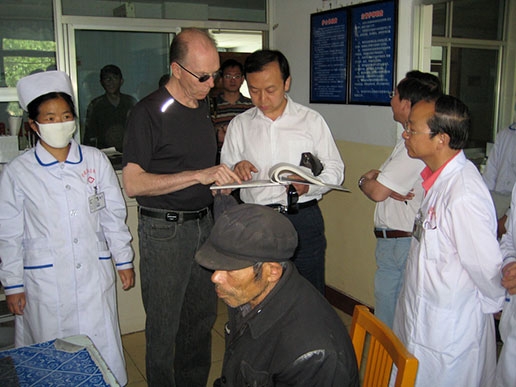Health Policy and Systems Sciences: A Framework for Policy and Management

Public health studies in Chinese medical universities have largely focused on the mechanisms for hygiene and disease control rather than the overarching framework of health policy and management. The emerging field of health policy and systems sciences (HPSS) integrates interdisciplinary knowledge from fields such as clinical medicine and public health, ethics and politics, economics and political science, and evaluation methods, combined with modeling and organizational theory.
This is new territory for many of China’s health professionals and educators. Through its grant-making, CMB aims to build capacity in critical academic fields to help China achieve a better performing national health system. It is supporting projects that will generate knowledge, advance education, and/or lead to innovative applications in four areas: changing health problems and disease burdens; health policies in finance, human resources, information, or technologies; innovations in health systems operations and management; and China’s connections to global health.
Programs at three CMB-affiliated universities show some of the practical applications of HPSS. In Guangzhou, one of China’s largest migrant-receiving cities, CMB grants have helped Sun Yat-sen University (SYSU) establish the Center of Migrant Health Policy. The most recent grant will support a major collaborative effort between SYSU and the UN Research Institute in Social Development on the demographic, socioeconomic, occupational, mobility, and healthcare aspects of migration.
Like many developed economies, China is now experiencing an increase in obesity. Zhejiang University School of Medicine is investigating the potential effectiveness and benefits of interventions to reduce the chronic diseases that often accompany obesity. Researchers will establish a database on obesity and obesity-related chronic diseases, project future trends in obesity, assess the effects of intervention, estimate the expected healthcare cost reductions, and offer the government recommendations for obesity prevention strategies.
China is undergoing rapid changes, including environmental and other health threats, that can be monitored by the type and frequency of birth defects. A grant to Peking Union Medical College will support the development of a birth defect monitoring network. Faculty will monitor 45 different kinds of common birth defects in pilot areas in Beijing, Guangdong, and Zhejiang, as a first step toward creating a national monitoring network.
Meeting challenges like these requires a qualified health workforce that can support a well coordinated, highly functioning health system. A CMB grant to Huazhong University of Science and Technology (Tongji) will strengthen HPSS faculty capacity at one of China’s premier medical universities, well known for its leadership in public health. Peking University Health Science Center, with CMB support and in cooperation with the Ministry of Health International Cooperation Department, is training two cohorts of young Chinese professionals to prepare for, participate in, and assess their practical training at the World Health Assembly.
Through these HPSS-related grants, CMB aims to enhance the knowledge, methods, and tools to improve health policies and systems performance in China.
